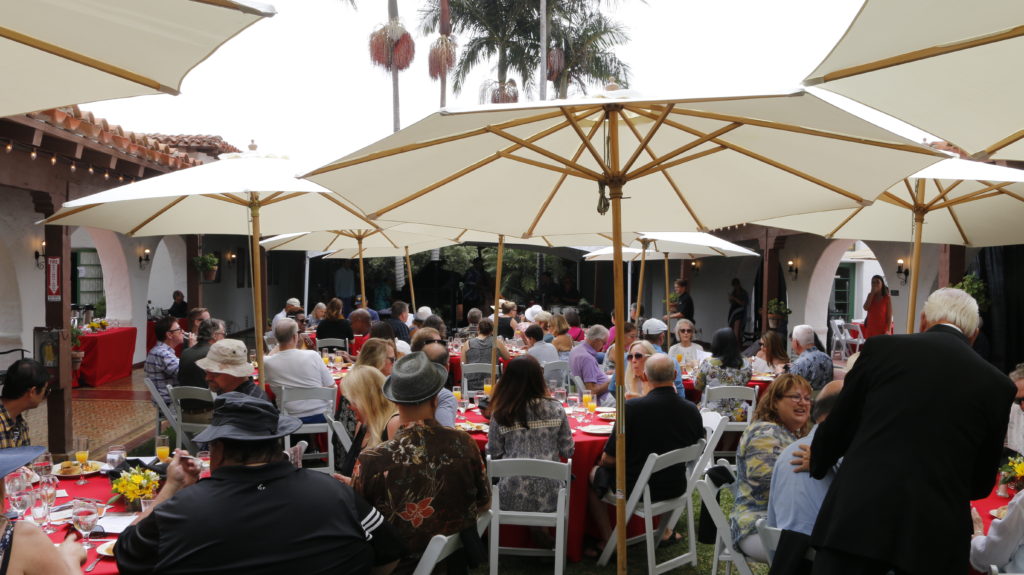
For day two of its 2nd Annual Casa Jazz Club this past Sunday, Casa Romantica Cultural Center and Gardens presented the Gilbert Castellanos Quintet. The San Diego-based five-piece brought sizzle to jazz standards and sparkle to an overcast afternoon.
Including Tommy Aros on congas who toured with Luis Miguel, one of the world’s greatest Latin singers, the quintet’s sassy and subtle execution of a set punctuated by classic jazz standards made a continuing case for the reinvigoration instead of reinvention of jazz.
The two-day two-headliner club had a marvelous setting: the courtyard of the seaside Spanish-revival former home of San Clemente founder Ole Hanson. Tickets aren’t necessarily cheap, but when you consider the level of talent and the opportunity to experience them in such an intimate and exquisite setting, the general admission price of $80 seems a worthy weekend getaway splurge, especially since a brunch menu catered by the local creole/cajun restaurant Iva Lee’s is included.
As bottomless mimosas were repoured, Castellanos announced the first song as “Open Sesame” penned by the late trumpeter Freddie Hubbard. The tune’s main refrain lends itself nicely to Latin rhythms and the quintet’s precise punctuation gave a vivacious kick to the already twittering tempo.
It’s always fascinating to watch musicians of this caliber wait and watch for clues as to how or when to change pace, jump in or follow. The unspoken language between Castellanos, Aros upright bassist Dean Hulett, pianist Irving Flores, and drummer Tyler Kruetel is fluid. Jazz—not so much a genre as a tradition—can suffer from lack of inspiration. Castellanos’s careful selection of tunes and the proficiency of the band ensured a performance crackling with life.
Standards included Latin-tinged interpretations of “Old Devil Moon” and a notable performance of “September in the Rain” in which, with the trumpet’s mute on, Castellanos imbued with romance.
“We’re going to let the percussion loose on this one,” he declared before launching into “Lotus Blossom” composed by Billy Strayhorn. By this time, the mimosas had kicked in for one semi-rowdy table.
Castellanos wasn’t afraid of a little party saying “I hope you are having as much fun as we are—keep drinking,” he told them. The almost tribal rhythmic patting of the song moved into a trumpet solo which turned from comedy to tragedy changing from a plaintive, almost comedic wail to a slow and melancholy refrain punctuated towards the end by a light finger tapping from drummer Kruetel. Throughout, Castellanos found key moments that remind us of the remarkable flexibility of the trumpet and its ability to move from comic to petulant to joyful to mournful.
The group closed out with “Gibraltar” which began with a kind of abstract piano intro that evolved into a clarion cascade. And so, the set ended with the same energetic flurry as it began. “Keep jazz alive,” Castellanos quipped before striding off the stage.
Casa Romantica’s efforts to lead and innovate in the arts and culture realm was given a shot of adrenaline when Executive Director Berenika Palys came on board several years ago. Palys, a Juilliard educated musician drew on her experience as founder, pianist and artistic director of the Dana Point Symphony as well as her time as a Fellow at the Kennedy Center in Washington, D.C. to bring an ambitious menu of experiences aimed for all ages.
It’s been a consistent build for the cultural center, one that’s starting to pay off as awareness grows. It’s a smart move to build the jazz club on quality and intimacy vs. trying to create a full-blown festival, but perhaps in the coming years it might be nice to see the roster grow a bit and perhaps to have a night geared towards students or for the community at a lower price point featuring lesser-known musicians.
However, as a lovely man I met who drove from San Dimas to stay overnight with his wife for the weekend can attest, it made for a lovely getaway. The quality of the talent and the execution of the experience is what made it special, so that should never change. As long as we’re keeping jazz alive, it’s all good.

